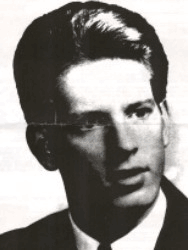
STANLEY ARTHUR NEWELL
SYNOPSIS: In the spring of 1973, 591 American Prisoners of War were released from prisons and camps in Vietnam. Among them were six of a group of nine U.S. Army 4th Infantry Division personnel captured in and near Pleiku Province, South Vietnam during the year of 1967 whose lives had been intertwined for the past six years. All had belonged to that part of the "Ivy Division" which was assigned to Task Force Oregon conducting border operations called Operation Sam Houston (1 Jan - 5 Apr 67) and Operation Francis Marion (5 Apr - 12 Oct 67). On July 12, 1967, SP4 Martin S. Frank, PFC Nathan B. Henry, Sgt. Cordine McMurray, PFC Stanley A. Newell, PFC Richard R. Perricone, SP4 James F. Schiele and PFC James L. Van Bendegom, all members of Company B, 1st Battalion, 12th Infantry, 4th Infantry Division, were conducting a search and destroy mission along the Cambodian border when their position was overrun by the Viet Cong. With the execption of Schiele, all the men were captured. The U.S. Army notes that Schiele and Van Bendegom were captured by the North Vietnamese, while the others, apparently, were captured by Viet Cong. PFC Schiele was seen by his platoon leader as his unit was forced to withdraw, leaving him behind. He had been hit a number of times by automatic weapons fire in the legs and chest and was thought to be dead. PFC Perricone stated in his debrief upon return to the U.S. that the enemy camp commander of Camp 102 told him that SP4 Schiele had died of wounds received in the fire fight. However, since there was no positive proof of death, the U.S. government placed Schiele in a Missing in Action category. Classified information given to the Vietnamese by Gen. John Vessey in 1987, however, states that both Schiele and Van Bendegom were captured by the North Vietnamese. PFC Vanbendegom was also wounded in the engagement, and was seen alive by other Americans captured in the same battle about one week after his capture at a communist field hospital in Cambodia, not far from his capture location. One of the released Americans was later told by the commanding North Vietnamese officer at his prison camp in Cambodia that SP4 Vanbendegom had died of his wounds. Vanbendegom was categorized as a Prisoner of War. The other seven Americans were held in prison camps on the Vietnam/Cambodia border for several months. According to the debriefs of releasees Sooter and Perricone, they and DeLong had attempted to escape from a border camp in Cambodia on November 6, 1967, but were recaptured the same day. Two days later, Sooter and Perricone were shown DeLong's bullet-ridden and blood soaked trousers and were told that DeLong had been killed resisting recapture. The Vietnamese included DeLong's name on a list of prisoners who had died in captivity (saying he died in November 1967), did not return his remains, and did not offer any explanation. STANLEY A. NEWEL Surrounded by his three sisters, Marti, Amy and Mrs. Brenda Lehman, and by his parents, Mr. and Mrs. Arthur Newell, Sergeant Stanley Newell left the airport on his return home. He had been on a search and destroy mission on July 12, 1967 in Pleiku Province near the Cambodian border when he was shot down and captured. He spent five and one half years in a prison camp. Sgt. Newell was first classified as missing in action. His family had no information about his capture until 1969 when a Japanese photographer produced a photo of three Viet Cong prisoners and his family identified him. When Stan returned home, he was eager to talk to people he knew and to resume his life. He greeted well-wishers at the plane with these words: "I've got to make a little speech to you all. The only thing I can say is 'Hi, it's great to be back and see you all. Everybody has done a great job all the way here. Glad to see you and I've got a few people to see.' " Sgt. Newell's greatest happiness came when he reached his home town. There he felt truly that his ordeal was over. "I feel like a person again. I always said, 'It's good to be back.' Now I can say it's good to be home, because I am home. I feel like a person again. I see a few faces out there I recognize, but don't take offense if I give you a hard look. I'm trying to remember." He added some lighthearted touches: "My parents have tried to prepare me for today, but I never expected anything like this. I think it's still the old town I left. I saw quite a few changes in the styles, especially on the boys (hair styles). I guess it grows on you!" His plans include his marriage to Shari Peplow of Clarksville, Tennessee, whom he knew and dated before entering military service. She is well acquainted with military life, since her father is a retired Sgt. Major who spent two tours in Vietnam. Sgt. Newell, although surrounded by personal happiness, had this to say on the day he returned home: "Although this is the happiest day of my life, I never can be truly happy until all the boys are released from Hanoi." 1998 Major Newell retired from the Army and is now a teacher. He resides in Alabama. |
||
Having Been Led by Love of Country |
|

